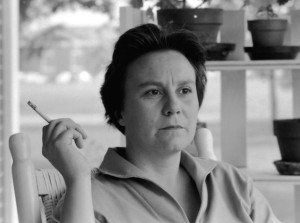 The estate of Harper Lee has decided to end its relationship with Hachette publishers, which was licensed through HarperCollins to produce a mass-market paperback edition of To Kill A Mockingbird. HarperCollins will continue to produce a trade paperback version. See these reports from The New Republic and The Guardian. Since the author only died this year, under current law the novel would not enter the public domain until 2086, though the duration of copyright tends to get longer rather than shorter with each revision, and so even that date cannot be depended on. School districts buy lots of mass market copies, and so that will be a big budget hit for them.
The estate of Harper Lee has decided to end its relationship with Hachette publishers, which was licensed through HarperCollins to produce a mass-market paperback edition of To Kill A Mockingbird. HarperCollins will continue to produce a trade paperback version. See these reports from The New Republic and The Guardian. Since the author only died this year, under current law the novel would not enter the public domain until 2086, though the duration of copyright tends to get longer rather than shorter with each revision, and so even that date cannot be depended on. School districts buy lots of mass market copies, and so that will be a big budget hit for them.
I’ll leave it to others to discuss the ethics of the case. But does the decision make economic sense? After all, we teach that price discrimination can be a way for firms in the arts (commercial and non-profit) to increase revenue at the same time as making lower-priced options available for the more price-sensitive consumers. True, but there are limits. Suppose you have the option of producing hard-cover (usually around $25), trade paperback (usually around $14), and mass-market paperback editions (usually around $7) of a novel. You know there is a small market for the hard-cover version, for people buying gifts or who simply want to have ‘the best.’ The trade paperback will be for those readers not so interested in the hard-cover. So offer at least those two versions. But what of the mass-market version? The problem is that it might be seen by buyers as too close a substitute for the trade paperback. Seen side-by-side in a bookshop, customers who would have been willing to buy the trade paperback pick up the cheaper mass-market version – the small difference in quality does not justify paying the big difference in price between the two versions. And so eliminating the mass-market version can be a profitable move. This is not uncommon – I don’t think you can find new mass-market copies of Hemingway either. Managers in other arts fields are familiar with this issue: fine to ‘scale the house’ for your show, but you can’t maintain big price differences if the quality difference between seating areas does not justify it in the minds of ticket-buyers.
And so, yes, the move can be a sensible one from the estate’s point of view.

Not even close on the public domain date — works published in the US before 01 Jan 1978 have a flat 95-year term, not a term related to the author’s lifetime. To Kill a Mockingbird will enter the public domain on 01 Jan 2056 (95 years after publication in 1960, moved to 01 January of the next calendar year). That’s still quite a while from now, but a thirty-year difference from what is stated…
I happily stand corrected.